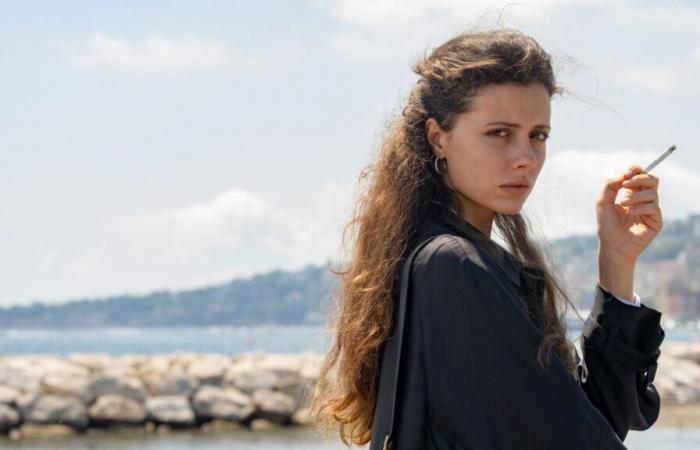Parthenopeof Paolo Sorrentinowe could describe it with the title of another of his great films: The great beautybecause it talks about beauty and youth, but also about intelligence. Plus, it's visually spectacular and has an amazing soundtrack. The life journey of a woman, from her birth in the 1950s to the present dayin a setting that comes to life: the city of Naples. A film that arrives This December 25th in theaters and about which we have spoken with its director and with the protagonist: Celeste Dalla Porta.
“It is an update of the classic hero's journey, as well as the life adventures of a person,” the director tells us. And it seemed much more interesting and intelligent to me. that it was the journey of a free womanwhich does not depend on any man. Because I think that Today's women are more heroic than mensince they have been fighting for their rights for two millennia. And they also have a more mature approach to life than men.”
This is the Italian's first film starring a woman: “I always want to make films about universes that I don't know, such as the female universe, What seems like mystery and beauty to me?. That's why I had been trying to write a story about a woman for years, but until now I had not found the financing to be able to film it.”
“Looking is the hardest thing”
There is a line in the movie that says: “Looking is the hardest thing.” We asked Sorrentino if that can be applied to a film director. “I think you have to look for your own perspective. Never look how others look. I look for metaphors. For example, at a house party, people watch others dance, but I direct my gaze to one of the coats.”
“For me,” he adds, a film director is also a good anthropologist (like the protagonist). There are directors who are most concerned about the plots and others for whom the most important thing is the characters. For me the most important thing is the characters and my work is something closer to psychology.”
“Parthenope is a woman who aspires to freedom”
The young Italian actress Celeste Dalla Porta (Milan, 1994), is the great discovery of this film. Curiously, in 2020, when he was studying cinematography in Rome, he recorded a scene for It was the hand of godSorrentino's previous film, but it was left in the editing room. Here she plays Parthenope, a woman who captivates the other characters with her beauty, but who is only interested in cultivating her intelligence.
“She is a woman who aspires to freedom -the Neapolitan actress tells us-. And that series of encounters that she has in the film, with other characters, is a way of acquiring knowledge and understanding something more about herself.”
“In this search for knowledge,” adds the actress, “she is aware of the power she has due to her beauty and uses it when it suits her. Although then you can concentrate on other more intellectual games. Beauty is a tool that animals use and can be important, but it can also be somewhat painful when it fades”.
“For this reason,” Celeste adds, “women who, even though they are beautiful, care about cultivating their intelligence, They will be freer and will not feel the weight of aging as much. And they will grow personally. Although I think people can also be very beautiful when they get older.”
In the film, Parthenope is born into a wealthy family and grows up with her younger brother, to whom she is very close. But his death, to whom she is very close, will make her leave the comfort of her home. “Her family has given her great freedom since she was little,” Celeste tells us. But sometimes we are not prepared for so much freedom. Therefore, on that journey he will try to structure himself and build certain rules that allow him to be truly free.”
“Parthenope seeks answers in anthropology”
That journey will lead her to look for answers at the university: “In anthropology, Parthenope tries to try to find many things,” the actress confesses to us. To begin with, he wants to understand the reasons why his brother dies. And from there begins a long search during which important themes will emerge in the film, such as memory, love, death, life itself or the passage of time”.
“Themes,” Celeste continues, “that are fundamental to understanding human beings and their behaviors. She is very interested in all this and what anthropology allows her to reflect on the behavior of human beings. and also about her own behavior, about herself”.
“Physical and intellectual pleasure must go together”
During that trip, Parthenope seeks both intellectual and physical pleasure: “I believe that, both in the film and in life, both should go together,” says Sorrentino. They are also like two types of gymnastics, physical and mental. But for me the true pleasure is the sum of both”.
Gary Oldman He plays John Cheever, a writer that Parthenope admires and will try to get closer to, to which he will respond that “he doesn't want to steal a single moment of his life.” “Gary Olman was wonderful in his role,” says Sorrentino. “I think he's an outstanding actor. And that's why I waited until he could play the character.”
The veteran also stands out in the cast Stefania Sandrelliwho plays the older Parthenope. “She is also a woman who It represents very well that idea of beauty accompanied by intelligence -assures the director-. “I think he was the perfect choice for the role.”
Something that Celeste agrees with: “It was very nice, very nice that Stefania also played the character. She is a Parthenope almost more youthful than minethanks to that experience that he has accumulated during his life. She is no longer immersed in that vital search, but has already learned to enjoy life as it presents itself to her. She is in love with life. I am fascinated by his interpretation.”
“It was important that the director of photography be a woman”
When we ask him about his obsession with beauty, Sorrentino answers us: “In the cinema I don't want to see ugly things, I want to see beautiful things. We already have the real world for ugly things.”
For the director it was important that the cinematographer of this film be a woman, also Neapolitan. Daria D’Antonio. “It was fundamental for me, because I believe that The gaze of a woman on another woman has a sensitivity and a depth greater than what any man's gaze could have achieved.”
By the way, Parthenope is the mythological siren who committed suicide after failing to charm Odysseus. His body was carried by the tide to the place that would later become Naples. A city that is another of the great protagonists of this film that hits theaters this December 25.






